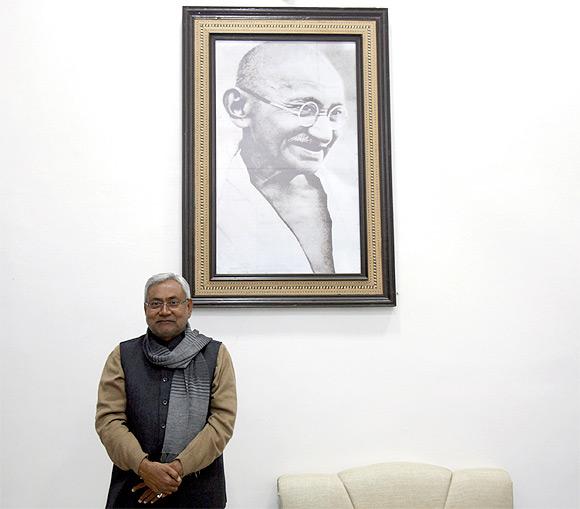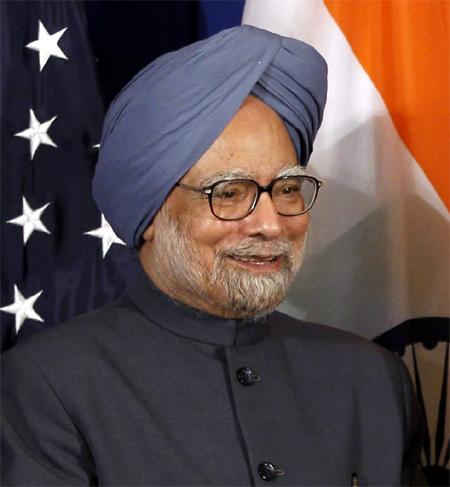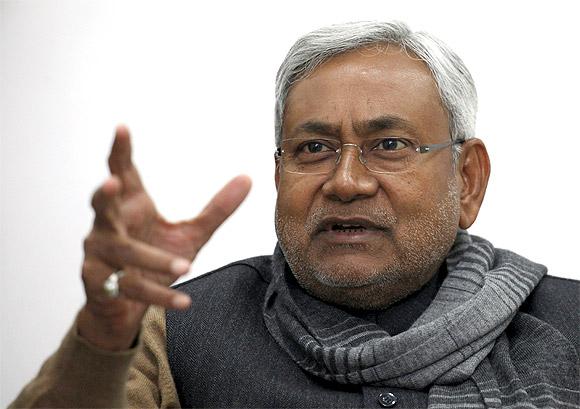 | « Back to article | Print this article |
'He agreed with everything I said'
"Delhi should let the states decide what they should do," Bihar Chief Minister Nitish Kumar tells Aditi Phadnis
"So how did your meeting with the prime minister go," I ask Nitish Kumar, 61, considered to be the chief minister who turned Bihar around, as he walks in. We are having dinner at the residence of a common friend: I, lured by the promise of great Bihari food; and he (I guess) at the chance of a quiet evening.
Kumar is in Delhi leading an all-party delegation from Bihar to meet the prime minister about coal linkages (or the lack thereof) that were holding back power generation in the state. He reaches into his pocket and takes out a piece of paper. "Before I left Patna, I noted down some lines that I thought I would read to him. But I never got the chance -- because he agreed with everything I said," he says wryly. "It is an extract from Rashmirathi," he says by way of explanation.
I raise an eyebrow. Rashmirathi is a long poem by Ramdhari Singh Dinkar on the circumstances that led to the Mahabharat. Over the ages, Karna had been a character neglected by poets, as there was some hesitation in acknowledging Kunti's first child because he was illegitimate and cast away by his mother in a soop (rice winnower). In the 1960s, poets recognised the injustice history had done to Karna and there was a rash of writing about him. Rashmirathi has a fabulous passage (and this is the one that Kumar wanted to recite to the prime minister) where Krishna warns Duryodhana -- and Karna by his side -- that the time for prayer and entreaty was over. It was going to be war unto death because Duryodhana had rejected the hand of friendship. The lines read: "Ab yaachana nahin rann hoga/jeevan jai ya ki maran hoga" (Now there will be no entreaties but battle/for life or death).
A bit drastic surely? Were relations between the Centre and Bihar really that bad?
"I firmly believe," says Kumar, "that barring the control of a few ministries, Delhi should let the states decide what they should do. But this is the problem: whenever 'they' have come to power, the delicate balance between the Centre and the states has always been lost." By "they" he means the Congress. He doesn't have to spell it out. His face says he's smelling bad odours.
Click on NEXT for more...
'A conspiracy to make two towns in Bihar fight'
"Uthaane aata hai raat mein..." (they come to pick them up at night) he says suddenly. All present know exactly what he's saying. He's complaining about the newly empowered anti-terror bodies that have been arresting people – especially Muslims – from remote Bihar villages, without extending basic courtesies like involving or informing the local police. "I have given them specific examples of how they've picked up people without letting us know why. We don't even know where those people are. I have never spoken publicly about this but there's a limit to it. How can you fight terror in the states and not trust state governments?"
Apparently, when the Centre called a conference of senior police officials on the National Counter Terrorism Centre, Bihar considered boycotting the event. "I overruled the idea. You have to be present there and say what you want. Boycotting doesn't help," he says.
Dinner is served: Plantain cutlets (I think they are mutton and regrettably wave away the first lot until it is clarified they are vegetarian — by which time the other guests had wolfed down many of them) redolent with pepper, garlic and mustard oil; bhindi cooked crisp, arhar dal with tadka, dry methi-aalu, rotis kneaded with bathua (a kind of green you get only in winter, making them taste smoky and nutty) and steaming, fragrant rice.
Kumar discusses other injustices the Centre has meted out to Bihar: the state wants a central university at Motihari, the Centre wants one at Gaya. "You watch: ultimately it is just a conspiracy to make two towns in Bihar fight among themselves," he predicts darkly. The tug of war over the university at Nalanda continues, something that the major donors -- Bihar, which has given the land, and China, Japan and Singapore, which have given the funds -- are simply unable to comprehend. Work over setting up the university is moving at a glacial pace. Kumar vows to address this the next time he is in Delhi.
Click on NEXT for more...
'They have left us far behind'
We move to other things. The last movie he saw was Well Done, Abba (he thought it was wonderful) and Mangal Pandey (because there was some controversy about the film in Ballia: why he didn't know). He almost never watches TV because he hates addictions and has no patience with pontification. We wince.
He has just been to China. What did he think of a country that socialists in India were taught, politically, to detest? Rammanohar Lohia and Madhu Limaye and even George Fernandes's views on China are well known.
"That is all in history," he says. Kumar's insights about politics and society in China are deep and complex. As a trained engineer, he says, he could only feel awe at Shanghai's multilevel flyovers. "They have left us far behind," he says with painful honesty. But, he says, it was clear that whatever the regime in China was doing, communism was the ruling ideology.
How did he reach that conclusion? "Mao's mausoleum is open just two hours a day. But you should see the queues of people who want to pay homage to him. I went to the Great Wall. There, a plaque had one of Mao's sayings. A young boy translated it for me with such palpable pride...," he says.
"... and what is more," he adds, his voice catching with pain, "they've done it all in their own language! They didn't have to learn English to take their country to such great heights! They did it in Chinese. I know we keep telling our people to learn English. In our country, if you don't know English, you can't get a job. But look at them!"
"This is the difference," he says. "They took knowledge and turned it into their language. We mistook language for knowledge." That was profound.
Click on NEXT for more...
'I am not a magnanimous man'
"Would you like to live in China?" I ask Kumar. "No, not all!" he exclaims. He goes on to tell us a story.
During the Emergency, when they were all in jail, also with them was a beggar who had been rounded up on charges of vagrancy. "The beggar had no family. He sometimes couldn't get two meals a day. And yet, of all us in jail, he was the one most anxious about when he would be released. He was getting two full meals, two sets of clothes, and yet all he wanted was to be free. This is why I am an Indian. I am independent. There is nothing beyond liberty," he says.
There was a moment of silence. Dessert is served: cut fruit with custard (most un-Bihari, but health considerations weighed in). I introduce a slightly contentious note. "What we were discussing in the Parliament House lobby," I say, choosing my words carefully, "was: what possessed Nitish Kumar to re-nominate King Mahendra to the Rajya Sabha?"
King Mahendra is the proud alias (on the Janata Dal United website) of Dr Mahendra Prasad, the fabulously wealthy owner of a group of pharma industries who has the distinction of being backed to the Rajya Sabha irrespective of who is in power and, despite half-a-dozen terms is still to make a noticeable impact.
Slightly taken aback, Kumar shot back, "Isn't he from Bihar?" By way of explanation, he says, "All the MPs have been re-nominated and he is one of them."
I attempt to look impassive. "I am not a magnanimous man given to using my discretion to reward favourites. Everyone has a purpose. He has been chosen because of his utility and not for any other consideration," he says, adding that he would certainly ask him (King Mahendra) about the critical scrutiny he had been facing from the media. As he rose to leave, he repeats what he had said earlier: his decisions were guided purely by the larger interests of Bihar.
Click on NEXT for more...
TOP photo features of the week
Click on MORE to see another set of PHOTO features...





